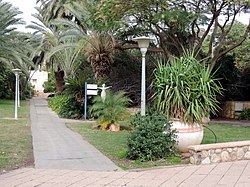Kalya
| Kalya | |
|---|---|

Kibbutz Kalya
|
|
| Coordinates: 31°44′55.11″N 35°27′58.42″E / 31.7486417°N 35.4662278°ECoordinates: 31°44′55.11″N 35°27′58.42″E / 31.7486417°N 35.4662278°E | |
| District | Judea and Samaria Area |
| Council | Megilot |
| Region | West Bank |
| Affiliation | Kibbutz Movement |
| Founded | 1929 (original) 1968 (current) |
| Founded by | Dead Sea Works employees |
| Population (2015) | 394 |
| Website | www.kalia.org.il |
Kalya (Hebrew: קַלְיָה) is an Israeli settlement and kibbutz in the West Bank. It was originally established in 1929 but was occupied and destroyed by the Jordanians in 1948; it was later rebuilt in 1968 after the Six-Day War. Located on the northern shore of the Dead Sea, 360 meters below sea level, it falls under the jurisdiction of Megilot Regional Council. In 2015 it had a population of 394.
The international community considers Israeli settlements in the West Bank illegal under international law, but the Israeli government disputes this.
The name Kalya is derived from kalium, the Latin name for potassium, a chemical found in abundance in the region. Kalya is also a Hebrew acronym for "קם לתחייה ים המוות" (Kam Litkhiya Yam HaMavet), literally, the Dead Sea has returned to life.
The kibbutz was first established during the British Mandate era. Moshe Novomeysky, a Jewish engineer from Siberia, won the British government tender for potash mining on the Dead Sea's northern shore, the marshland surrounding the plant was drained and housing was built to accommodate employees of the Palestine Potash Company. The company, chartered in 1929, set up its first plant on the north shore of the Dead Sea at Kalya and produced potash, or potassium chloride, by solar evaporation of the brine. It employed both Arabs and Jews.
Kalya was spared violence in the 1936–39 Arab revolt due to good relations with the Arabs; the plant employed many Arab laborers from Jericho. Despite negotiations between the kibbutz leadership and Jordan's Arab Legion to preserve the kibbutz under Jordanian control at the time of the 1948 Arab–Israeli War, the imprisonment of Jews in the Jordanian-held Naharayim complex and the Kfar Etzion massacre led David Ben-Gurion to call for the residents' evacuation and their consolidation in the southern Dead Sea. Residents of Kalia and nearby Beit HaArava ultimately fled by boat on 20 May 1948, and the two kibbutzim were destroyed by the Jordanians. The area remained unpopulated save a Jordanian military camp.
...
Wikipedia

